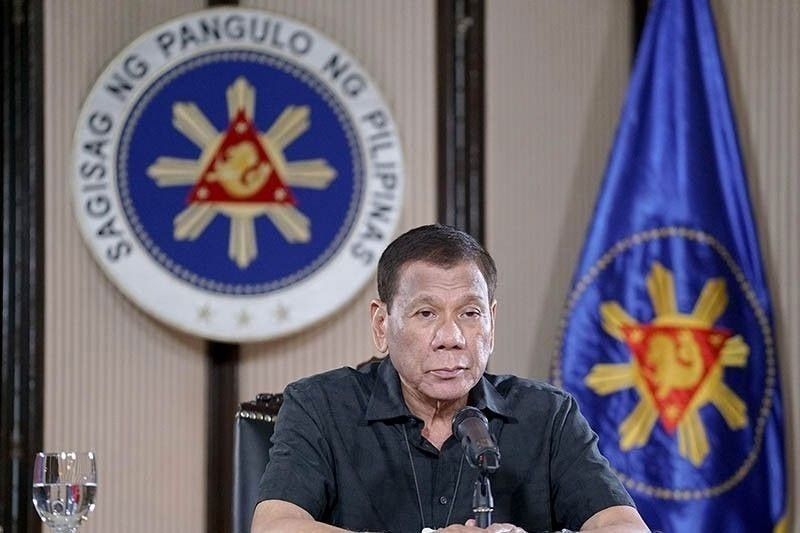Duterte: Not all drug war records can be opened

MANILA, Philippines — The government cannot release all records of the controversial war on drugs because of “national security” issues, President Duterte said yesterday as he urged human rights groups to be careful in assessing deaths linked to the campaign.
Duterte said drug syndicates could have also orchestrated the killings.
He said rights advocates could check police records on joint law enforcement operations from a “healthy distance,” but some details like the sources of information should remain confidential.
“This is a lesson for the rights advocates... I suggest that you go to the police and look into the records of these deaths... We cannot give everything not because we are hiding some facts that are known to us, unknown to you.
It’s a national security issue,” the President said during a meeting of the government’s pandemic task force last Monday.
“We have records (of) those who have died, who have derogatory records in our files. It contains references about persons and what they do.
We cannot divulge it to anybody but only to the military and to the police,” Duterte said.
More than 5,000 drug suspects have been killed since Duterte launched the war against drugs, a campaign promise that won him by a landslide in 2016 elections.
Officials insisted the government does not tolerate extrajudicial killings and other human rights violations, and that most of the slain suspects resisted arrest.
Duterte said he does not ask law enforcers about confidential information.
“I am just result-oriented. I told the police or the military who perform their duties and had to kill their adversaries, especially those related to drugs and even the NPA (New People’s Army), we cannot give everything. You can go into the...query as to how the battle was fought, how the gunfight started,” Duterte said.
“But when you talked about what prompted the police and the military to go into this kind of operation based on their reports and collated dossiers, you cannot touch on that... Even if you ask around, I never asked about those things. It’s because I know that it’s just confidential. And if they do not present it to me, I do not ask for it,” he added.
Duterte said government forces inform him about “big personalities” but their location and the manner by which they would be arrested are “none of my business really as President.”
He issued the statement after the Philippine National Police (PNP) allowed the Department of Justice (DOJ) to access 61 anti-drug campaign cases, a move that drew praise from various sectors, including the Commission on Human Rights.
Presidential spokesman Harry Roque said the President was not referring to the information-sharing between the two agencies.
“The information on ongoing police investigation is a traditional exception to the right to information. It does not cover the sharing of information being done by the PNP and the DOJ on the possibility that some police personnel are liable for the killings. But the ongoing police investigations are never subject to freedom of information,” Roque said yesterday.
“The President has said he would back police personnel who are responding to their call of duty. But if they violated the law, they’re on their own. That’s also the instruction when it comes to information,” he added.
“Of course, sensitive information involving live investigations cannot be disclosed. But everything else that can help promote accountability and improve the professionalism of the police are not covered.”
Duterte said human rights advocates should be cautious in examining the deaths tied to the narcotics crackdown, noting many police officers also died during anti-drug raids.
He said some of the deaths were perpetrated by drug syndicates who want to silence potential informants.
“So be careful in your – especially the (Commission on) Human Rights – be careful in your evaluation and assessment because the government is not the only one capable of killing. Even the NPA and drug lords know how to kill. There lies the problem,” Duterte said.
“Some people are killed by drug lords so they won’t be included in the narrative. They do it especially when the government already smells something and if they think this person will squeal, the drug lords would kill them and then we would be accused of doing it,” he added.
Duterte said drug addicts could be killed if they clash with soldiers and policemen who underwent training.
“They will surely die. And if you claim that they were deliberately killed, no. They really fought back,” he added.
Meanwhile, Justice Secretary Menardo Guevarra said the DOJ would keep in mind Duterte’s concern on national security when reviewing cases related to the anti-drug war.
“My understanding of what the President has been meaning is in the light of the ongoing cooperation between the DOJ and the PNP, a proper concern should be given to security matters.”
As for the 61 cases, Guevarra said these are criminal matters, more of a criminal nature than a national security concern.
He gave assurance that when the DOJ and PNP examine the 61 cases, they would “play it by ear.”
“We will just make it a point to determine whether there is any national security concern involved in each particular case. If we do not see (any national security concern) and this is an ordinary criminal case that needs to be investigated and prosecuted, regardless of the offender, then we will do so in accordance with our mandate as DOJ and as PNP. But we’ll take note of the President’s concern and we’ll keep that in our mind as we examine each and every case folder that we’ll get into our hands,” Guevarra said.
PNP chief Guillermo Eleazar earlier said that of the 61 reported drug cases, only 53 would be shared with the DOJ as the rest are on appeal. – Evelyn Macairan
- Latest
- Trending






























